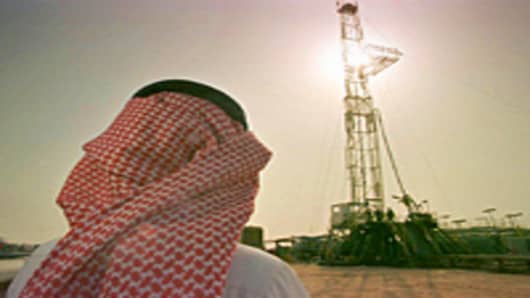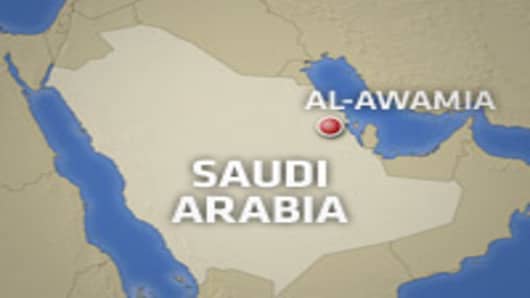The sudden spike in oil prices following Thursday's report of a pipeline explosion in Saudi Arabia highlights how nervous traders are about turmoil in the region—and the long-running distrust between Saudi Arabia and Iran.
Iran’s state-run Press TV said an explosion in the town of Awamia “destroyed the pipelines feeding one of the most important oil hubs in the world.” The report sent oil prices soaring and US stocks lower.
Oil officials told CNBC shortly thereafter that the reports were false, causing oil prices to pare their gains and stocks to recoup some of their losses.
On Friday, oil prices continued to fall back, with Brent crude off nearly two percent and US crude down well over two percent.
The Saudi denial offered little consolation to those fretting about rising oil prices. There are several examples of authorities downplaying domestic unrest since the uprisings spread across the region last year.
Indeed, unresolved tensions remain in that particular part of the Kingdom. A lack of reliable information and multiple corroborating sources, often due to the difficulty of journalists obtaining access, complicates the matter further.
Awamia lies in the Eastern Province of Saudi Arabia and is the birthplace and pulse of what is the world’s largest oil exporter. The area, to include other flashpoint towns such as Qatif, has seen sectarian tensions spiral into violent clashes between the Shi’ite Muslim minority and security forces of the Sunni-ruled monarchy several times in the past few months.
The Eastern Province is also home to the largest oil field in the world, Ghawar, as well as several key refineries, export terminals such as Ras Tanura, and the 5 million barrel per day East-West pipeline that connects to the Red Sea (one of the few alternative routes to the Strait of Hormuz).
Press TV’s report, an article of which remains unchanged on its website, also states Iran’s decision to cut off oil exports to some European Union countries pushed oil prices “to a nine-month high”. A tit-for-tat series of measures in a dispute over the country’s nuclear programhas left many unsure about where it’s all going.
It would not be the first time that the security of the Kingdom’s oil infrastructure is questioned by traders. The “terror premium” of 2003/2004 quickly comes to mind, set in motion after a domestic terror wave began.
Terrorists attempted to disrupt oil production, stormed the US Consulate in Jeddah and bombed residential compounds of expatriates. Conservative estimates by experts at the time placed the “terror premium” at around $5 per barrel. Taking an oil price of $40 per barrel then, the premium translates into 10-15 percent, equivalent to at least $12 a barrel today. And as is the case now, OPEC’s spare capacity was running thin.
Iran, which like Saudi Arabia heavily depends on oil exports for its government revenues, has made no secret of its reservations about Saudi Arabia’s pledge as a swing producer to keep global markets well supplied. In January, it warned Gulf oil producers not to replace lost Iranian oil as a result of sanctions, warning of “unpredictable” consequences.
Questions? Comments? Email us at marketinsider@cnbc.com



